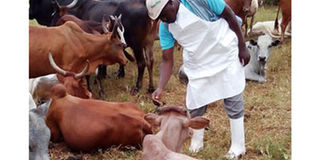Minister, official clash over vaccination fees

Monitoring. A veterinary doctor examines cows infected by the foot and mouth disease in Buliisa District in September 2017. Government has opposed the move by Rakai District officials to charge livestock vaccination fees. FILE PHOTO
What you need to know:
- Background. Currently, government is carrying out mass vaccination of cattle in Kiziba and Kyalulangira sub-counties in Rakai District to combat the spread of foot and mouth disease in the area.
Rakai. State minister for Animal Husbandry Joy Kabatsi has clashed with Rakai District veterinary officer Erias Kizito Nsubuga over the livestock vaccination fees.
Although Dr Nsubuga says each livestock farmer is supposed to pay Shs2,000 for vaccination of each cow against foot and mouth disease (FMD), the minister insists that such fees are illegal since the veterinary officers in all districts are fully facilitated by government to do their work.
Currently, government is carrying out mass vaccination of cattle in Kiziba and Kyalulangira sub-counties in Rakai District to combat the spread of FMD in the area.
The two sub-counties are exposed to FMD outbreaks due to influx of livestock through the porous Uganda-Tanzania border points.
“It is improper for those veterinary officers to charge money from farmers under the guise of facilitating them to do their work. All veterinary officers are fully facilitated whenever they are going to the field. They are given vehicles, fuel and transport allowances,” Ms Kabatsi told Daily Monitor in a telephone interview on Wednesday.
She said she was shocked to learn that livestock farmers still pay money to veterinary officers to vaccinate their animals.
“As a ministry, we condemn in the strongest terms that act of soliciting money from farmers. Veterinary officers, who are still doing it, should stop with immediate effect,” she added.
On the contrary, Dr Nsubuga said the fees being collected motivate the veterinary officers to do their work. He said part of the money is used to buy automatic veterinary injection syringes, fuel and sometimes to hire motorcycles to the field.
“Farmers have been paying those fees since the 1990s. So, it [fees] is not new to farmers and the district council is aware,” he said.
The clarification by the minister comes days after livestock farmers under their umbrella body, Nyekundiire Farmers Association in Kyalulangira Sub-county, complained over the money being asked by veterinary officers to vaccinate their animals.
Mr Robert Kanyete, the association chairperson, claimed that when individual farmers refuse to pay the vaccination fees, they are threatened with arrest.
“Veterinary officers are conniving with some police officers to terrorise our members and as leaders, we have always wondered whether those charges are legal,” he said.
Mr Herbert Tumwesigye, the officer-in-charge of Dyango Police Post, dismissed reports that police officers connive with veterinary officers to extort money from farmers. “I don’t even know whether they [farmers] pay money or not. We intervene only when farmers refuse to take their cattle for vaccination,” he said.
Kyalulangira Sub-county alone is estimated to have 2,000 head of cattle and if all are vaccinated, Shs4m would be generated by the district.
Last December, government suspended movement of cattle on the Uganda-Tanzania border in an effort to curb the increasing animal diseases in the country.
The first FMD outbreak in Uganda was recorded in 1953. Since then, outbreaks occur annually and do not seem to follow a particular pattern. The last outbreak occurred last year.




